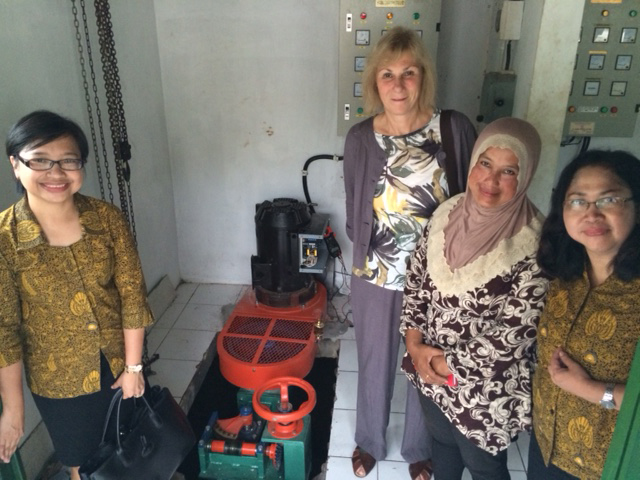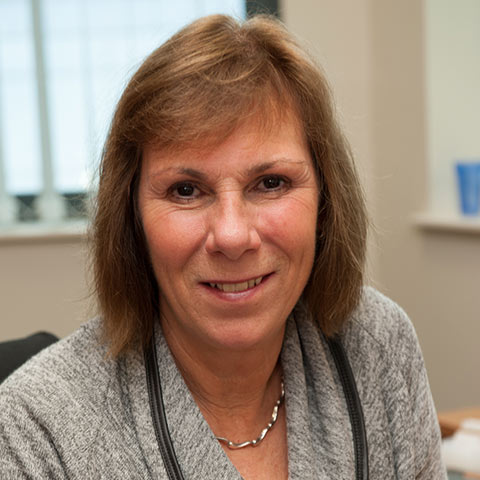Poor levels of communication can mean that isolated villages in Indonesia are failing to utilise sustainable technology such as micro hydro and solar power, installed by their government and designed to transform their economic fortunes.
Professor of Corporate Communications Anne Gregory is helping the Indonesian Government in its efforts to help rural villages to adopt and exploit renewable energy technology for the benefit of their communities. The task in hand is not just about technical solutions, but about communication.
The research, funded by the British Council, focusses on Indonesia, but the solutions that emerge will be relevant to all developing countries. The project is already being cited as a valuable case study in the field of science communication.
Professor Gregory holds the Chair of Corporate Communication at the University of Huddersfield Business School. For this project she is collaborating with a team headed by Dr Gregoria Yudarwati, who is Deputy Dean of the Faculty of Social and Political Sciences Universitas Atma Jaya, in Yogyakarta, Indonesia. The government in Indonesia has a policy of encouraging rural communities to use sustainable energy resources such as solar, micro hydro and biogas, rather than relying on centrally-generated electricity, which can be intermittent or not available at all.
A communication issue

Professor Gregory and her co-researchers are working with several Indonesian villages where the sustainable technology is now in place. Getting the communities to adopt and exploit the technology is the problem – and that’s a communication issue.
“A scientist can go in and say this is how the technology works and we’ll train you mechanically, but nobody talks to the people about the potential of it in a way that makes sense to the community,” said Professor Gregory.
Therefore, the British Council grant was awarded to help with the communication issues around the adoption of sustainable technology in rural Indonesia. Fieldwork and research are ongoing – Professor Gregory and her University of Huddersfield colleague Dr Johanna Fawkes have paid visits to Indonesia and met local communities and government officials – and the output will be a highly-practical communication blueprint.
Appreciative Inquiry
Professor Gregory and her collaborators are using an approach named “Appreciative Inquiry”. “It is about trying to get people to imagine the future. For example, what could happen in the community if the lights were on in the school after dark; if you had a workshop with reliable energy 24 hours a day or if the women, instead of having to wash clothes by hand, had a communal launderette. We can then work through what needs to happen to make those dreams a reality. By taking ownership of the potential of the technology we can encourage them to adopt and exploit it fully. From there we can identify who they need to talk to, when, on what and why and who needs to talk with them. So for example, they need to talk to local government about maintenance costs, to technical people about the electrical capacity they need, to village groups about development priorities and so on.”
The aim is to map what their communication needs are and create a blueprint, which, when it is finalised, can be piloted throughout Indonesia. It should also have relevance to other parts of the developing world.
The British Council is impressed by the progress so far and when it recently held a science journalism workshop in Surabaya, Indonesia, the University of Huddersfield project was used as case study for one of the sessions. The event, intended to improve standards of science and technology communication, was a prestigious one, with participants who included selected journalists and ten researchers who had received coveted backing from the British Council’s Newton Fund.

Spotlight
Dr Anne Gregory
Dr Anne Gregory is Professor of Corporate Communication at the University of Huddersfield. Professor Gregory heads specialist research and consultancy programmes for private and public sector clients such as the UK Cabinet Office, The Department of Health and the European Commission. Her work has led to Government policy initiatives and she is an advisor to UK Government having completed three attachments. She is a Reviewer of Government Department Communication. Professor Gregory is a former Chair of the Global Alliance, the worldwide body of over 60 national and international public relations associations which is a recognised NGO by the UN. She was awarded the Sir Stephen Tallents Medal by the Chartered Institute of Public Relations (CIPR) in 2010 for her outstanding contribution to the profession, made an Honorary Fellow of the CIPR in 2015 and was given the Pathfinder Award for her outstanding research contribution by the US based Institute of Public Relations in 2015. To find out more about the research in this article, please contact Professor Anne Gregory: a.gregory@hud.ac.uk
Autumn 2017 Issue
Return to the home page for the Autumn 2017 Issue of Discover.
Next article
The first people to suspect or know about someone becoming involved in planning acts of terrorism will often be those closest to them...
